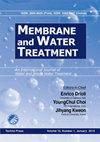间歇氯化改变了反渗透膜上的海洋生物膜群
IF 1.1
4区 工程技术
Q4 ENGINEERING, CHEMICAL
引用次数: 5
摘要
研究了氯对海洋细菌群落的影响。非氯适应海洋细菌群落(NCAM)和氯适应海洋细菌群落(CAM, 0.2 mg-Cl2/L氯处理细菌群落)培养1个月。NCAM与CAM之间存在明显差异,两者仅共享8个操作分类单元(operational taxonomic units, otu),占已识别otu总数的13.1%。这一结果表明氯对海洋细菌群落的变化负有责任。水基单胞菌是一种耐氯的海洋细菌。研究了不同氯浓度(0、0.2、0.4、0.6和0.8 mg Cl2/L)间歇氯化对反渗透(RO)膜表面形成的两种海洋生物膜群落的影响。虽然在7周的时间里,反渗透膜上附着的海洋细菌的平均数量随着氯浓度的增加而减少,但在整个实验过程中,消毒效率呈现出较大的波动。这是由于间歇氯化过程中氯的消耗。这些结果表明,间歇氯化不是控制生物膜形成的有效消毒策略。本文章由计算机程序翻译,如有差异,请以英文原文为准。
Intermittent chlorination shifts the marine biofilm population on reverse osmosis membranes
The influence of chlorine on marine bacterial communities was examined in this study. A non-chlorine-adapted marine bacterial community (NCAM) and a chlorine-adapted bacterial community (CAM, bacterial community treated with 0.2 mg-Cl2/L chlorine) were cultivated for 1 month. A distinct difference was observed between the NCAM and CAM, which shared only eight operational taxonomic units (OTUs), corresponding to 13.1% of the total number of identified OTUs. This result suggested that chlorine was responsible for the changes in the marine bacterial communities. Kordiimonas aquimaris was found to be a chlorine-resistant marine bacterium. The effect of intermittent chlorination on the two marine biofilm communities formed on the reverse osmosis (RO) membrane surface was investigated using various chlorine concentrations (0, 0.2, 0.4, 0.6 and 0.8 mg Cl2/L). Although the average number of adherent marine bacteria on the RO membrane over a period of 7 weeks decreased with increasing chlorine concentration, disinfection efficiencies showed substantial fluctuations throughout the experiment. This is due to chlorine depletion that occurs during intermittent chlorination. These results suggest that intermittent chlorination is not an effective disinfection strategy to control biofilm formation.
求助全文
通过发布文献求助,成功后即可免费获取论文全文。
去求助
来源期刊

Membrane Water Treatment
ENGINEERING, CHEMICAL-WATER RESOURCES
CiteScore
1.90
自引率
30.00%
发文量
0
审稿时长
>12 weeks
期刊介绍:
The Membrane and Water Treatment(MWT), An International Journal, aims at opening an access to the valuable source of technical information and providing an excellent publication channel for the global community of researchers in Membrane and Water Treatment related area. Specific emphasis of the journal may include but not limited to; the engineering and scientific aspects of understanding the basic mechanisms and applying membranes for water and waste water treatment, such as transport phenomena, surface characteristics, fouling, scaling, desalination, membrane bioreactors, water reuse, and system optimization.
 求助内容:
求助内容: 应助结果提醒方式:
应助结果提醒方式:


